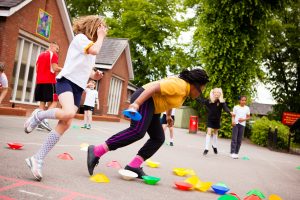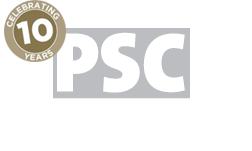Children at Broadstone Hall Primary School help prove physically active learning boosts activity levels and maths performance.
Broadstone Hall Primary School celebrates its role in a national programme that proves Physically Active Learning (PAL) drives activity levels and academic performance in primary school children.
Broadstone Hall in Heaton Chapel have been involved the programme, which has been part of a year-long study by education organisation, Aspire, to explore the positive impact the pioneering Maths On The Move programme has on physical activity levels and maths attainment.
Across the academic year, 2019 – 2020, 5,376 children aged 5-11 years, attending 179 schools took part in the programme which included 50 children, in Years 1 to 6 at Broadstone Hall Primary School. The overall results were extremely encouraging.
At the end of the programme, which involved the children attending a 60-minute Maths on the Move session once a week, 93% of the children demonstrated an improvement in maths performance, with an average improvement of 53.9% when comparing pre- and post- programme assessment scores. 80% of children also reported an increase in confidence relating to maths.
Speaking of the programme and how it impacted at Broadstone Hall, Deputy Head Teacher Andrew Bagguley, says: “Maths on the Move sessions are fun and engaging! The children have told us how much they enjoy the lessons and it’s been great to see the pupils’ confidence grow throughout the programme. Crucially, the sessions can be adapted to meet the needs of your learners. Our teachers worked alongside the Maths on the Move tutors to create a bespoke sequence of objectives to help address gaps in pupils’ knowledge and understanding. Following the series of lessons, tutors then provide detailed feedback and assessments which our teachers or Subject Leaders can use to identify next steps. Each session has a pre and post teaching assessment, and it’s clear that our children are making progress alongside having a great time!”
The programme has been warmly received by children and parents. Broadstone Hall pupil Sophia says: “Maths on the Move was lots of fun and a different way to learn with my friends. I enjoyed leaving the classroom and trying something new. I liked it was only a small group and not the whole class – as it is easier to say that you don’t understand something.” Whilst her mum, Sam said this of the MOTM lessons: “My daughter really enjoyed the Maths on the Move lessons she attended. I was pleased the school took part in this innovative programme, utilising a different approach to tackling tricky maths problems by using an active and interactive lesson. Thank you!”
Paul Griffiths, CEO, Aspire, explains why PAL programmes are so important: “Prior to lockdown, Sport England’s Active Lives Children and Young People Survey reported that less than half (46.8%) of children aged 5-15 were achieving the Chief Medical Officer’s recommended 60 minutes of physical activity a day.. During lockdown, this figure dropped to just 19%, leaving 81% of children falling short of achieving the daily activity targets deemed necessary to maintain good health1. The in-school activity target is 30 minutes of moderate-to-vigorous physical activity (MVPA) per day.
Andrew Stanton, Head of Education, Aspire, adds: “Now all children have returned to their school setting and they can get back to their familiar routine, it is more important than ever that physical activity becomes an integral part of the school day. Creating structured, active learning programmes like Maths on the Move, enables the introduction of more opportunities for children to be active, providing an alternative opportunity to learning at a desk.
“As a nation, if we are to protect the health of our children and drive academic performance we need to add another dimension to the classroom setting so that a physically active learning environment and programme can enhance and complement the traditional approach”
This national study has been supported by a six-week study, conducted by academics at Leeds Beckett University prior to lockdown, September – December 2019. This piece of work involved the enrolment of 140 children, aged 9–10 across three schools. Children in each school were divided into two groups with half the children taking part in a six-week, Maths on the Move programme whilst the other half continued with their traditional classroom-style learning, creating a control group.
The six-week study conducted by Leeds Beckett University evidenced that the children who took part increased their average daily activity levels and demonstrated improvements in maths performance.
Physical activity was measured via accelerometers worn by the children during the school day andmaths performance was measured via two tests. The maths attainment test was designed by Aspire to assess numeracy in line with the Year Five National Curriculum. A second assessment, the MathsAddition and Subtraction, Speed and Accuracy Test (MASSAT), was used to test speed and accuracyin addition, subtraction and inverse operations.
In terms of the physical activity, on average children secured an additional 5 minutes of moderate-to-vigorous physical activity (MVPA) and 5.7 minutes of light physical activity (LPA), with a reduction of 9.5 minutes of inactive time compared to the children who remained in the classroom setting. These results help demonstrate how Maths on the Move can contribute to schools meeting current government guidelines, set out in the School Sport and Activity Action Plan, that children are active for 60 minutes every day, half of which they should do during school hours.
Maths attainment test performance significantly improved over time for children on the Maths on the Move programme with their scores increasing from a baseline average score of 11.3/25 (45.2%) to 18.1/25 (72.4%) compared to the control groups increasing from 10.1/25 (40.4%) to 11/25 (44%) over the same period of time. No changes were observed in the MASSAT results.
Aspire has been delivering physically active learning programmes since 2010 and Maths on the Move for five years. Currently, 31 partners, covering 179 schools are delivering Maths on the Move across England, from Yorkshire to Hampshire. 6,234 children are currently enrolled in the programme. On the back of the Leeds Beckett study results, Aspire will be nationally launching Maths on the Move to schools via its national network of delivery partners from June 7, 2021, targeting Key Stage 1 and Key Stage 2 children.
Griffiths concludes: “We are very proud of Maths on the Move. The research confirms what we always suspected. Children respond positively to an active learning environment. The integration of physical activity to support academic learning can boost confidence and improve academic performance. Physical activity in school needs to be integrated into daily routines rather than positioned as an optional extra. Physically active learning is proven to be an effective way to achieve this.
“The programme has been designed to provide total flexibility to schools. Suitable for all abilities, it can be tailored to suit pupils’ individual requirements, working equally well as an intervention to support lower achieving children or as an extended learning opportunity for those who are gifted and talented. We have even seen it successfully introduced as a pre-SATs booster programme.”
Following the success of Maths on the Move, Aspire are now developing English on the Move. It is expected that this programme will be available from September 2021 for integration into schools from January 2022.
Maths on the Move has been designed to meet the funding criteria laid out by both the PE and sports premium (introduced to help primary schools create positive physical activity experiences for pupils), and the Pupil Premium (introduced to help schools improve the attainment of their disadvantaged pupils).
MOTM LBU Final Research Report (May 2021)

